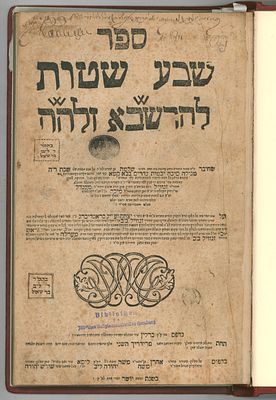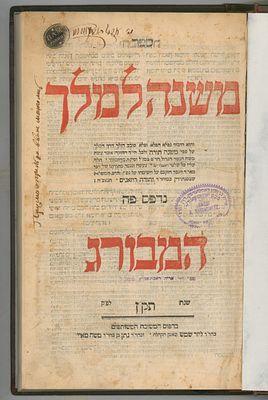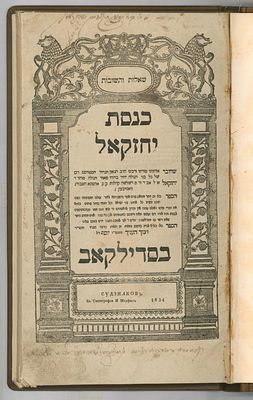1. Sefer Bnei Chayai: Commentaries on the Four Turim, by Rabbi Chaim ben Rabbi Menachem Algazi, zt"l.
Only Edition, "Here in the village of Ortaköy, near Constantinople, " 1712.
An antique ownership inscription on the last page reads, "This sefer belongs to the great Rabbi Nahman of Lissa, called Reb Nahman of Shklov."
Additional inscriptions include,
"I also agree with the author on all matters…Yom Tov Elm…”
"I also agree with the author on all matters…Yom Tov Elm…”
2. Sefer Beit Yisrael: Commentaries on Shulchan Aruch Yoreh De’ah, by Rabbi Israel Darshan Shapira, with Beit Peretz on Tractate Megillah by his grandson Rabbi Yissachar Ber Shapira.
First Edition, Berlin, 1726.
Signature on the title page
"Yonah, son of Rabbi Avraham Bondy, "
"Yonah, son of Rabbi Avraham Bondy, "
Rabbi Moses Yonah, son of Rabbi Avraham Bondy (1728-1806) of Prague, a student of the Nodah B’Yehudah and renowned Talmudic scholar, also known as a pious individual. His insights are partially preserved in "Turei Zahav."
3. Sefer Sheva Shetot by the Rashba (Rabbi Shlomo ben Aderet), Berlin, 1756.
Signature of the Gaon Rabbi Moshe Berlin of Poznan, inscribed with
"I purchased this with my means, in honor of my Rock and Redeemer, the undersigned Moshe, son of Rabbi Eliezer Lazi, Pozna. 1787"
"I purchased this with my means, in honor of my Rock and Redeemer, the undersigned Moshe, son of Rabbi Eliezer Lazi, Pozna. 1787"
Several significant antique marginal notes.
Ownership inscription (in the form of handstamp) of Rabbi Leib bar Shaul’s Beit Midrash in Hamburg.
Rabbi Moshe Berlin of Poznan was born in Poznan to his famous father, Rabbi Elazar Lazi, Ab”d of Altona-Hamburg-Wandsbek (AHU). When his father was appointed Av Beit Din of AHU, he called Rabbi Moshe to join him in Hamburg as a member of the study hall established by the benefactor Reb Leib, son of Reb Shaul. This institution, a Kloiz, was dedicated to supporting Torah scholars by providing for all their needs so they could study without financial concerns. Rabbi Moshe was the first scholar selected by the benefactor to join his Beit Midrash, and he devoted his life to Torah study there.
In 1815, he fulfilled his father’s wish and brought *Mishnat Rabbi Eliezer*, his father’s work, to print. This edition received a warm endorsement from Rabbi Akiva Eiger, who praised Rabbi Moshe with high regard and honorable titles. Rabbi Moshe Berlin passed away in 1829.
4. Sefer Minchat Yaakov: Commentary on the laws of forbidden and permitted foods, by Rabbi Yaakov ben Yosef Reischer.
Fürth, 1763, based on the original Prague 1689 edition.
Bound with: Torat HaShlamim, commentaries on Yoreh De’ah, laws of Niddah, and responsa by Rabbi Reischer, Fürth, 1763.
On the title page of the sefer are signatures of the renowned Rabbi Teveli Haas, Av Beit Din (head of the rabbinical court) of Mannheim, with the inscription: "
The earth is the Lord’s, and all it contains, Teveli Haas." Rabbi Teveli is also mentioned in the responsa Noda B’Yehuda.
The earth is the Lord’s, and all it contains, Teveli Haas." Rabbi Teveli is also mentioned in the responsa Noda B’Yehuda.
Additionally, there is an ownership inscription reading,
"May God grant me in this, the sacred Hirsch, son of the late R. Meir Troyb, of blessed memory."
"May God grant me in this, the sacred Hirsch, son of the late R. Meir Troyb, of blessed memory."
Rabbi Hirsch Troyb was the rabbi of Mannheim, Germany. At one time, he served alongside Rabbi Yaakov Ettlinger, author of Aruch LaNer, who was a rabbi of the Kloiz and taught there as well. Rabbi Troyb fought rigorously against the Reform movement, and one of his strong letters on the topic was published in Torat HaKana’ot (Amsterdam, 1845). An endorsement from him also appears in Sadeh Chaim (Rodelheim, 1845).
Rabbi Hirsch Troyb maintained close connections with other prominent rabbis in Germany, and his opinion was widely respected. He passed away in the summer of 1849.
5. Sefer She’iltot DeRav Ahai Gaon with commentaries She’ilt Shalom and Rishon LeTzion by Rabbi Yeshaya Berlin.
First edition, Dyhernfurth, 1786.
Signature:
"Dedicated to God, Rabbi Yaakov, son of Rabbi Zalman Posen.”
"Dedicated to God, Rabbi Yaakov, son of Rabbi Zalman Posen.”
Rabbi Yaakov Posen (1772–1849), who served on the rabbinical court of Frankfurt alongside Rabbi Haflaah and the Machane Levi.
6. Sefer Mishneh LaMelech by Rabbi Yehudah Rozanes. Final standalone edition before it was bound with the Mishneh Torah,
Hamburg, 1790.
Stamps:
Rabbi Aryeh Rabinowitz of Shawil, Dayan of Johannesburg.
Rabbi Aryeh Rabinowitz of Shawil, Dayan of Johannesburg.
7. She’elot u’Teshuvot Maharik by Rabbi Yosef Kolon, Lviv, 1798. Printed by Rabbanit Judith Rozanish.
Signature: Naftali, son of the late Rabbi Aryeh, and stamp
of Rabbi Asher Zev Werner, member of the Moetzes Gedolei HaTorah of Agudath Israel, a disciple of his uncle Rabbi Moshe Kliers of Tiberias.
of Rabbi Asher Zev Werner, member of the Moetzes Gedolei HaTorah of Agudath Israel, a disciple of his uncle Rabbi Moshe Kliers of Tiberias.
8. Sefer She’iltot Aviah: Responsa and novellae by Rabbi Aaron Karfunkel, Av Beit Din of Nahod and the surrounding area.
Only edition, Berlin, 1806. Printed by the Youth Education Society.
Divided into twelve sections, named after the stones of the High Priest’s breastplate; only two parts, Bareket and Nofech, were printed. A list of supporters from various European cities is included, featuring prominent rabbinic figures like Rabbi Elazar Fleckeles of Prague and Rabbi Shmuel Landau.
The sefer bears the signature and stamps of the esteemed Rabbi Yitzchak Leib Eiger, with the inscription: "Yitzchak Leib, son of the esteemed R. Akiva Eiger."
Rabbi Yitzchak Leib Eiger (d. 1871) was the beloved son of Rabbi Akiva Eiger, a leading Torah scholar of his generation. From a young age, Yitzchak Leib was dedicated to Torah study, with his father frequently citing discussions and debates he had with him, even during his youth: "My son, the insightful groom Yitzchak Leib, inquired… and I answered him…" (See Drush v’Chidush, Ketubot 40b). After his marriage, Rabbi Yitzchak Leib lived in Lamza and later moved to Johannisburg, Prussia, where, in 1862, he published his father’s commentaries on *Shulchan Aruch* (Orach Chaim). In 1868, he was appointed leader of the community in Johannisburg, where he worked tirelessly for the welfare of its Jewish residents (HaMagid, Shevat 1868). His life and deeds are further recorded in *Me’oran shel Yisrael* (Strasser, Vol. II, p. 316). Some of his Torah insights were published posthumously in Otiyot d’Rabbi Akiva (London, 1979), which includes his commentaries on *Chullin* based on what he learned from his revered father.
The sefer also includes the
signature and stamp of Rabbi Zev Wolf Leiter, Av Beit Din of Pittsburgh (1892–1974), a renowned halachic authority. Rabbi Leiter was the son of Rabbi Natan Neta Leiter, Av Beit Din of Lviv and author of Ma’orot Natan. Recognized as a prodigy from a young age, Rabbi Zev Wolf earned high praise from Rabbi Shalom Mordechai Schwadron, author of Daas Torah. He received rabbinical ordination from Rabbi Avraham Binyamin Kluger and Rabbi Avraham Menachem Halevi Steinberg. At just 30, he published his responsa Beit David. Rabbi Leiter served as a dayan in Trembowla and, in 1920, emigrated to the United States, where he became the Av Beit Din of Pittsburgh. He corresponded with leading rabbis of his time and maintained close ties with the Rebbes of the Ruzhin dynasty, including Rabbi Yisrael of Chortkiv and Rabbi Yitzchak of Boyan.
signature and stamp of Rabbi Zev Wolf Leiter, Av Beit Din of Pittsburgh (1892–1974), a renowned halachic authority. Rabbi Leiter was the son of Rabbi Natan Neta Leiter, Av Beit Din of Lviv and author of Ma’orot Natan. Recognized as a prodigy from a young age, Rabbi Zev Wolf earned high praise from Rabbi Shalom Mordechai Schwadron, author of Daas Torah. He received rabbinical ordination from Rabbi Avraham Binyamin Kluger and Rabbi Avraham Menachem Halevi Steinberg. At just 30, he published his responsa Beit David. Rabbi Leiter served as a dayan in Trembowla and, in 1920, emigrated to the United States, where he became the Av Beit Din of Pittsburgh. He corresponded with leading rabbis of his time and maintained close ties with the Rebbes of the Ruzhin dynasty, including Rabbi Yisrael of Chortkiv and Rabbi Yitzchak of Boyan.
Additionally, there is an ancient signature reading: "Yechezkel Mordechai, son of R. Shmuel”
9. Sefer Petach HaBayit: Various novellae by Rabbi Avraham Tikotin, Av Beit Din of Breslau.
First edition, Dyhernfurth, 1820.
Signature: "
Dedicated to God, Binyamin, son of Rabbi Hirsch Niederhofheim."
Dedicated to God, Binyamin, son of Rabbi Hirsch Niederhofheim."
Rabbi Binyamin Niederhofheim (1810–1885), known for performing over 7,000 circumcisions and maintaining the Sephardic minyan of Rabbi Nathan Adler, later continued in his home as "The Niederhofheim Synagogue.”
10. Sefer Knesset Yehezkel, Sadilkov, 1834.
Antique signature dated 1837: Menachem Tzvi HaKohen, son of Rabbi Moshe.
Overall Good - Great condition, Complete copies.
Share this lot:
Lot #23




























































